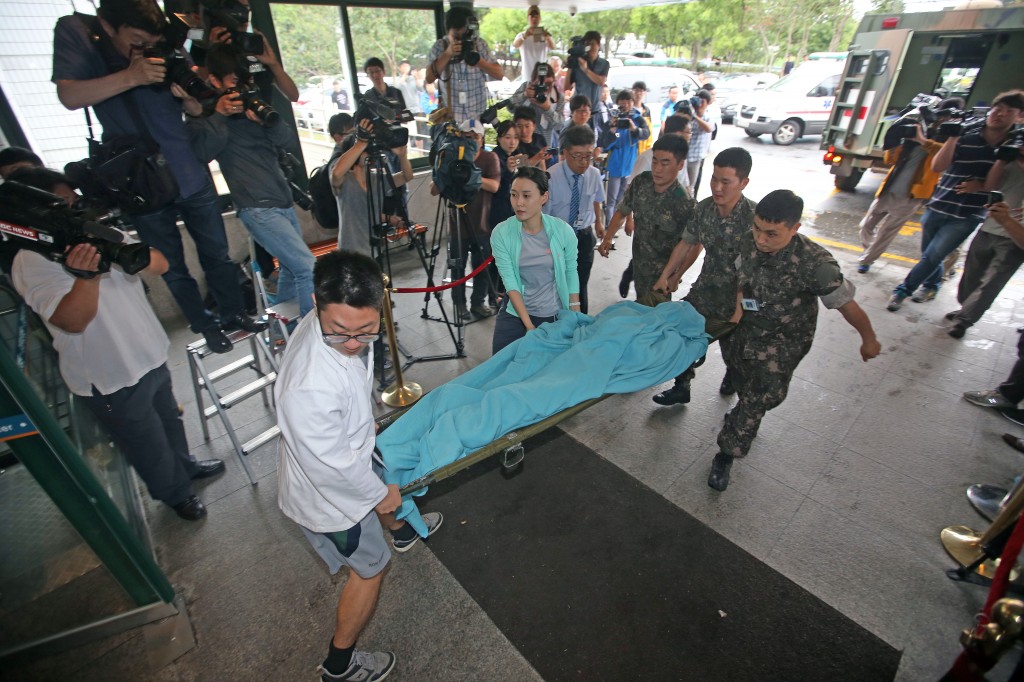- California Assembly OKs highest minimum wage in nation
- S. Korea unveils first graphic cigarette warnings
- US joins with South Korea, Japan in bid to deter North Korea
- LPGA golfer Chun In-gee finally back in action
- S. Korea won’t be top seed in final World Cup qualification round
- US men’s soccer misses 2nd straight Olympics
- US back on track in qualifying with 4-0 win over Guatemala
- High-intensity workout injuries spawn cottage industry
- CDC expands range of Zika mosquitoes into parts of Northeast
- Who knew? ‘The Walking Dead’ is helping families connect
Soldier accused of killing 5 captured after suicide attempt

Military authorities and medical personnel carry an Army sergeant surnamed Lim on a stretcher in Gangneung Asan Hospital in Gangwon Province, Monday. The soldier who went on a shooting rampage that killed five colleagues on Saturday attempted to commit suicide after confronting the military for 43 hours following his desertion. He shot himself in the left side of his chest, but the injury was not serious, according to officials. (Yonhap)
GOSEONG/SEOUL, South Korea (Yonhap) — An enlisted soldier who fled after killing five comrades was captured Monday after a botched suicide attempt, the defense ministry said.
The 22-year-old sergeant, identified only by his surname Lim, “was captured at 2:55 p.m. (KST) after suffering a self-inflicted gunshot wound and was taken to a nearby hospital,” ministry spokesperson Kim Min-seok said.
He had been in a standoff with thousands of troops on a hillside near the inter-Korean border town of Goseong, about 220 kilometers northeast of Seoul, after being under siege, while resisting repeated calls to turn himself in.
“He was relocated to the intensive care unit at around 9 p.m. after undergoing surgery,” the ministry said, adding that the operation was successful and Lim is not in a life-threatening condition.
Lim was rushed to the hospital for emergency treatment after shooting himself in the chest, right above the heart, with his K-2 rifle during the standoff. A ministry official had said that Lim was conscious, but may lose consciousness due to the bleeding.
His capture came two days after he ran away with his rifle and about 60 rounds of ammunition after killing five colleagues and injuring seven others at a border outpost. Shortly after wrapping up his guard duty lasting about six hours on Saturday, Lim detonated a grenade and fired shots at his eastern front unit.
On Sunday, the military spotted his whereabouts, but failed to capture him as he first opened fire, which led to several rounds of gunfire. A platoon leader sustained minor injuries.
The military then launched operations to capture him early Monday, bringing his parents and elder brother, along with three unarmed officers, to the scene to plead with him to surrender.
“I have already committed such a tremendous incident, and I would face capital punishment if I go out. I can’t surrender,” Lim told the family, according to the ministry.
Some 30 minutes before shooting himself, he asked to get a pen and a sheet of paper, and left a note, the ministry official said, adding that the note was sent to the central investigative agency of the Army headquarters for thorough investigation.
Earlier in the day, a soldier guarding against Lim mistakenly opened fire at one of his comrades. After sustaining a minor injury, the injured soldier was taken to a nearby hospital.
“Gunshots heard in the day were not from contact with the deserter,” a defense ministry officer said. “No exchange of fire between (our side and Lim) took place today.”
Hundreds of residents, who were evacuated to safety to a nearby school gymnasium upon the exchanges of gunfire between him and the troops, have returned home. There were no reported civilian casualties.
The motive for the shootings remains unknown, though Lim was on a list of those requiring special attention as he had difficulty in adapting to military life, the Army headquarters said. He was to be discharged in September.
As he fired some 10 shots, the military suspected that he had aimed at the victims rather than shooting at random.
“It appears that what he did was not impulsive but premeditated. In general, those who have committed such a crime run away while discarding their weapon or surrender to authorities,” an officer of the Army headquarters said.
“His comrades said he was quiet and somewhat timid and has not been very much associated with them,” he added.
In a personality test in March 2013, he was categorized as a “Grade-A” soldier who needed special attention and was not fit for frontline service. The same test nine months later, however, found him to be a “Grade-B” soldier who was still on the list but capable of serving such duty.
Among the country’s some 500,000 conscripted soldiers, 3.6 percent were classified as the Class-A soldiers as of June, government data showed.
It is not the first time that an enlisted soldier has attacked his comrades. In 2005, a South Korean Army private set off a hand grenade and opened fire at a unit near the border with North Korea, killing eight sleeping colleagues and wounding two others.
In 2011, a Marine Corps corporal went on a shooting spree at a seaside unit on Ganghwa Island, west of Seoul, killing four soldiers and wounding one.
In South Korea, all able-bodied men are required to carry out compulsory military service for about two years as the country faces North Korea across the heavily fortified border.
South Korea’s military law stipulates that a soldier on active duty shall face capital punishment for killing his/her superior officer. The corporal in the 2011 shooting spree case received the maximum sentence allowed by law.















